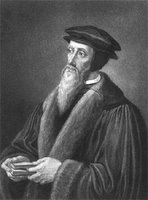 Author: Denis R. Janz, editor
Author: Denis R. Janz, editor
Publisher: Fortress Press (Augsburg)
Format: softcover
Publication Date: 2008
Pages: 453
ISBN: 9780800663100
Stars: 3 of 5
The Christianity that shapes our world today, was profoundly influenced by the Reformation — Roman Catholicism as much as evangelical Protestantism. For conservative evangelicals who prize the notion of sola Scriptura (Scripture alone), the Reformation represents a great restoration of the importance of Scripture and a revival of the true and saving doctrine of justification by faith on the basis of the merits of Christ alone, and by God’s free grace.
Any study of the Reformation does well to focus on the many documents and books written in that era. Some of the truly great Christian writings hail from that era. Luther’s commentary on Galations, and Calvin’s Institutes of the Christian Religion deserve the attention of Christians of our own era as much as they shaped those in the midst of the Reformation. But there are scores of additional writings by other lesser known figures of that time, which do much to open our understanding of what actually was happening in that time, now nearly 500 years ago.
A Reformation Reader, edited by Denis Janz, brings these lesser known documents, and figures, to light. Zwingli’s Swiss Reformation work and writings; the Anabaptist movement and their writings — most notably the the Schleitheim Confession; and the English reformers Cranmer and Cromwell all are illuminated through Janz’s inclusion of key documents and insights into their role in the Reformation era. The context of the Reformation is made more vivid and clear by his inclusion of pre-Reformation Catholic authors and sentiments, and a discussion of the counter Reformation and the Catholic Council of Trent.
Janz introduces each section with a brief introduction to that segment of the Reformation. The pre-Reformation, Luther, Calvin, Swiss Reformation, Anabaptist movement, English Reformation and the counter Reformation movements are all represented. Janz brings up various scholarly disputes in how to interpret the Reformation. He does a good job staying neutral and explaining what the questions are. He presents documents that are able to challenge both viewpoints, and he encourages a study of the texts themselves.
This book includes a wide array of material. It certainly would serve well as a text book for covering the history of that era. The role of women in society in that day is explored alongside the other more typical theological disputes. Janz includes the writings of female characters throughout the book to serve that goal.
The book is more than a textbook, however. It provides a fascinating amount of material for the average Christian lay reader to explore. I enjoyed the historical perspective and the inclusion of many of the original writings of the key players in the Reformation. Most readers today don’t acquaint themselves with historical writings of that era, and so the selections from Calvin’s Institutes and Luther’s writings, for instance, allows for a first encounter with some of the key leaders in the Church’s history. It is hoped that this book will spur on its readers to desire a deeper reading of the classic writings of the Christian faith. I know it has done that for me.
I will point out just a few of the many interesting selections I enjoyed here. They are selections from Thomas a Kempis’ The Imitation of Christ, Erasmus’ The Abbot and the Learned Lady, some of the actual indulgences of the era of Luther, Luther’s 95 Theses, Luther’s Preface to the New Testament, Zwingli’s Of Freedom of Choice in the Selection of Food, Zwingli’s 67 Theses, the Anabaptist Schleitheim Confession, an autobiographical account of Calvin’s life, letters and judgment concerning Servetus, and Thomas Cranmer’s Preface to the Great Bible.
I highly recommend this book, and the study of this important time in Christian history.
Disclaimer: This book was provided by the publisher for review. I was under no obligation to offer a favorable review.
This book is available for purchase at the following sites: Amazon.com or direct from Fortress Press.
 Loved by many, yet hated by more. John Calvin, the great Reformer, has bequeathed us a schizophrenic legacy.
Loved by many, yet hated by more. John Calvin, the great Reformer, has bequeathed us a schizophrenic legacy.